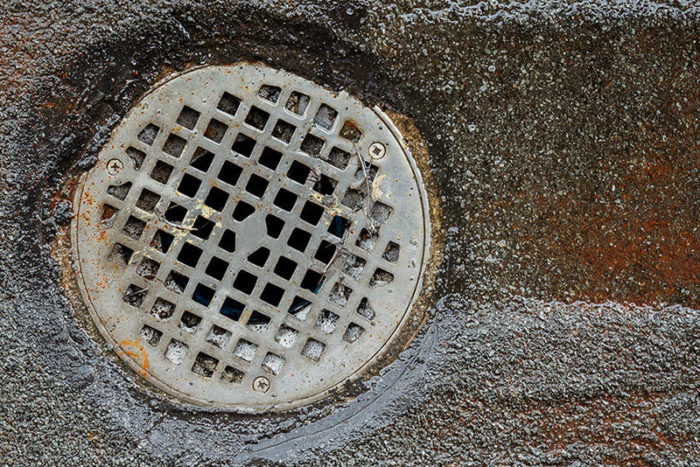Why is there a sewer smell in my basement?
A strong sewer smell coming from your basement can be caused by a clogged or dried out floor drain, a bad ejector pit seal, stagnant water ina sump pump pit, improperly vented appliances, or a damaged sewer line.
Floor Drains – Rarely-used floor drains in your basement are often the source of the sewer stench. These drains are designed with a trap to hold a small amount of water in order to seal the pipe so sewer gases don’t escape into the home. Over time, that seal can open as the drain dries up (condensation, etc.) from little use, releasing sewer gas into the basement and stinking the place up.
Solutions:
Pour a few gallons of hot water down the drain and wait 15 minutes. If this doesn’t help you can add a cup of baking soda, a cup of vinegar and three cups of boiling water. Wait until the bubbling stops and repeat. After a few cycles, you should see improvement.
If there is no improvement and you have access to an auger, you can attempt to clear any blockages that way.
Most floor drains have a cleanout plug that sometimes doesn’t get replaced. Without this plug, sewer gas has a direct path into your basement. If the drain is backing up, clogged, or not fixed with a good flush, you may need to contact a plumber for snake or water jet the drain.

Ejector Pit & Pump – If your home has an overhead sewer line in the basement, the ejector pit is required to be sealed with a cover and properly vented to contain the waste water. A missing lid, bad seal, or broken/clogged vent will quickly overwhelm your basement with sewer gas.
Solution: Make sure your ejector pit (if you have one) has a properly fitted lid with a good seal. Inspect the waste discharge pipe and vent pipe for any cracks or obstructions. Replace any components as needed to contain the sewer smell.
Sump Pump Pit – When your sump pump hasn’t run in some time, water in the pit can sit and become stagnant.
Solution: Test your sump pump to make sure it is working properly. If it is, try pouring a few buckets of water in the pit so the pump runs 2-3 cycles, ejecting stagnant water. You can also use bleach to clean the walls of the pit to alleviate odors.
Vents – Sometimes basement fixtures and appliances don’t get properly vented, preventing sewer gases from exiting the home.
Solution: Confirm that laundry rooms and bathrooms are vented correctly and actually tied in with the rest of the home. This applies to the whole home – sometimes smells originating on a main or upper level can make it to the basement.
Sewer Line – The sewage smell you’re experiencing could be a result of the sewer line being damaged. If this is the case and the leak is close enough to your home, the waste water would leak into the ground and make its way to the sump pit in your basement.
Solution: This is best handled by professionals. The most common troubleshooting method involves a leak tracing dye and running it through the bathtub or toilet and cycling the dyed water through to see if it reaches the soil. If a leak is identified, zeroing-in on the problem area is the next task and will determine how much work will be required to fix the leak.
If you still notice the smell after checking these common culprits, contact your preferred plumber for a more thorough inspection.
We do our best to provide current and accurate information, but this content could contain errors or information that is not correct for your situation or equipment. Resources found on our website are provided as general information. Reddi Industries does not assume any liability resulting from the provided information. If you attempt to repair or modify plumbing, electrical, or other equipment in your home or business, always consult your equipment’s operating manual first, and only do so if you are qualified.
